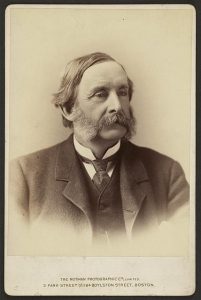
Thomas Wentworth Higginson is known primarily as Emily Dickinson’s mentor and epistolary interlocutor. “Are you too deeply occupied to say if my Verse is alive?,” the poet famously demanded of him in a letter from 1862. Yet Higginson was a 19th-century Renaissance man, a reformer and writer in his own right. Born in Cambridge six years after Thoreau in 1823, Higginson likewise went to Harvard and was the youngest in his graduating class. He attended Harvard Divinity School and practiced as an ordained Unitarian minister, although his radical views on politics and social issues—he invited the fugitive slave and future Clotel author William Wells Brown to speak for his Newbury congregation, for example—threatened the more conservative factions of the church and brought about his resignation in 1849.
Higginson was an outspoken abolitionist and participated in the Boston Vigilance Committee to help slaves who were in the process of escaping. Less than three years after supporting John Brown’s raid on Harpers Ferry, Higginson became colonel of the First South Carolina Volunteers, the first Black Union regiment to fight in the Civil War. In addition to his abolitionist commitments, Higginson was a staunch supporter of women’s rights, and after the war worked as an organizer of both the New England and American Woman Suffrage Associations. He was one of the first editors of the 1870-founded Woman’s Journal, a suffragist periodical.
Yet Higginson was as much a literary figure as a political one; his essays and poems, some of which were published in outlets like The Atlantic, cover a capacious thematic reach ranging from polemics on race and gender-based injustice to essays of literary criticism and meditative, lushly descriptive nature writing informed by Thoreau’s prose. Higginson, who in his own words “walked, talked, and corresponded” with Thoreau, held Thoreau’s work in great regard. Higginson admired Thoreau for “never, like some of his imitators, treat[ing] literary art as a thing unmanly and trivial.” Like Thoreau, Higginson regarded aesthetic experience and literary craft as pursuits just as worthwhile as more “active & administrative” employments like commanding armies and writing laws. In 1861, Higginson declared:
Higginson particularly appreciated Thoreau’s preternaturally fine powers of observation, and would copy passages from Thoreau’s voluminous journal into his own field book. Thoreau’s “daring admiration ventured on the delineation of just those objects which seem most defiant of description, as smoke, mist, haze,” Higginson wrote after Thoreau’s death, and, like his friend and associate, he endeavored to capture the most evanescent and ineffable facets of Northeastern seasons and flora and fauna. In an 1858 Atlantic essay he titled “Water-Lilies,” Higginson portrays the way that lilies expand in the early morning hours, noting that “[i]ndeed, that experience of Thoreau’s, of watching [the lilies] open in the first sunbeams, rank by rank, is not easily obtained, unless perhaps in a narrow stream.” While Higginson emulated Thoreau, Thoreau also esteemed Higginson’s work, and particularly admired an essay Higginson published in the Atlantic called “Winter,” which urged Northeastern readers to see vitality in a season often portrayed in literature as gloomy and bleak.
Higginson died in 1911 at age 87 and is buried in Cambridge Cemetery in the city of his birth.
Selected Works
- Short Studies of American Authors (1880)
- Army Life in a Black Regiment (1882)
- Lydia Maria Child (from Contemporaries. Boston: Houghton Mifflin, 1899)
- Wendell Phillips (from Contemporaries. Boston: Houghton Mifflin, 1899)
- The Complete Civil War Journal and Selected Letters of Thomas Wentworth Higginson
Works Cited
—. Short Studies of American Authors (Boston: Lee and Shepard, 1880).

